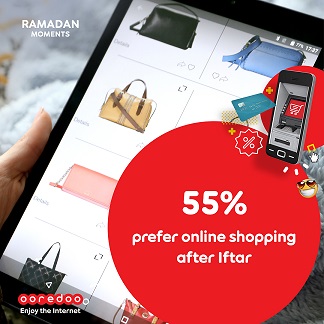 Digital Interaction Now a Major Part of People’s Spiritual Journey in Qatar, Kuwait, Oman, Tunisia and Algeria
Digital Interaction Now a Major Part of People’s Spiritual Journey in Qatar, Kuwait, Oman, Tunisia and Algeria
Digital interaction and online sharing have become part of people’s spiritual journey during the Holy Month of Ramadan, according to the results of a major multinational survey from Ooredoo.
The survey explores consumer behaviour during the Holy Month of Ramadan and examines the changing ways that people are enjoying the Internet during this time of year.
In all, 60% of respondents share Ramadan greetings through social media platforms, with Qataris and Kuwaitis the biggest users of social media.
More than 1,400 people in Ooredoo’s footprint in Qatar, Kuwait, Oman, Tunisia and Algeria participated in the study. The results will be used to map online activity and content preferences during Ramadan, which will enable Ooredoo to further refine its portfolio of digital options created especially for the Holy Month.
Commenting on the survey, Sheikh Saud bin Nasser Al Thani, Group CEO, Ooredoo said: “Ramadan is a time that brings us all together, uniting families and communities as we consider the needs of the spirit. This survey was an opportunity for Ooredoo to measure the common factors we share across our regional footprint, and also to look at how technology, when used responsibly, can enhance our spiritual journey.”
The special Ramadan study provides interesting data across surveyed countries and sheds some light on the great similarities and contrasts in behavioural patterns in the GCC and North Africa when it comes to using the internet, socialising during the Holy Month, and other areas.
Internet usage during Ramadan
Social media and Internet usage are generally higher during Ramadan, as people send messages and greetings to their loved ones, stream TV series and religious content, and shop online.
Responses captured by the survey found that a significant 60% of respondents share Ramadan greetings through social media platforms, rather than text and video message.
People share more religious content and fewer photos of food during the Holy Month. In fact, the survey has found that 64% of the respondents share photos on social media, while only 25% of them share food-related photos during Ramadan.
In terms of messaging, despite the popularity and variety of the messaging apps, 47% of the respondents use only one or two messaging apps and 25% of the respondents don’t use any.
The survey also showed that 55% of the respondents prefer shopping online, mostly after having Iftar, with the majority shopping for clothes (52%) and electronics (53%).
Health and lifestyle
Considering the shorter working hours during the Holy Month, 58% of the surveyed population say they exercise during Ramadan at least once a week, with most respondents claiming to exercise two-to-three times every week. The most popular form of exercise (57%) is running and jogging.
As the Holy Month is known for large family gatherings, 64% of the respondents said they prefer to eat in, with most of their time after Iftar spent watching TV and going to the Mosque.
In total, 73% claim to be cooking at home, suggesting that online ordering has yet to overtake home cooking in popularity.
Sheikh Saud concluded: “The core behaviours we associate with Ramadan – closer social ties, gathering at home for Iftar, going to the mosque to pray, sharing with neighbours and loved ones – have remained constant. What has changed is that people are using digital channels to help organise and support these activities. This reinforces our mission to empower our customers across our global footprint to access and enjoy the best of the Internet in a way that is very personal and unique to them.”
As part of this year’s Ramadan campaign, Ooredoo has also launched a new commercial that celebrates the traditions of the Holy Month and the spirit of togetherness in specific #RamadanMoments that people now enjoy as part of their daily digital lifestyles.
Ooredoo’s Ramadan commercial, which can be watched on all Ooredoo social media channels, was designed to demonstrate how people in different countries enjoy the internet and illustrate the common themes that unite different communities.


